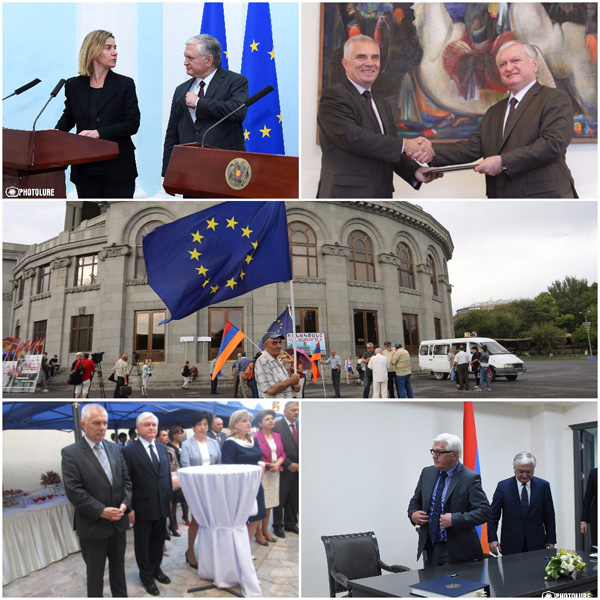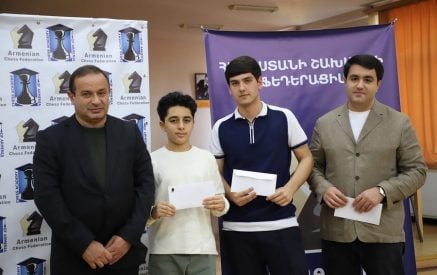Till the end of the year the negotiations on the Armenia-EU new comprehensive legal document will be over
Since the start of his ruling in 2008 President of Armenia Serzh Sargsyan has announced for many times, “We strive for the European values”, “Our aim is to make Armenia a modern, strong country, where the citizen will feel prosperous, secure and with protected rights”. In December of 2014 on the occasion of the opening of the European Public Law Organization (EPLO) Serzh Sargsyan received Professor Spyridon Flogaitis, President of the Board of Directors of the EPLO and said, “Our country is also the advocate of spreading the European values in the region and since the independence by cooperating with the European partners in this direction, the country has sufficiently proceeded, yet there are many problems and we greatly highlight their solutions”.
This year in June Vigen Sargsyan, the Chief of Staff of the Presidential Administration of RA at that time, during the meeting with the committee members of the European Youth forum speaking to the European youth noted that Armenia is a part of the European family in terms of value system, approaches of development and reforms and the basis of it are not the political motivations but a process with which we are trying to find the best solutions to develop the economy, state building and in many other issues. In ensuring a new level of the relationships with the EU, the level of sincerity of the Armenian authorities is easy to be checked.
Before that the authorities of Armenia from time to time were raising the question of EU-Armenia visa facilitation. Last year in March Minister of Foreign Affairs of Armenia, Eduard Nalbandian, in his speech delivered during the session of the Committee on Political Affairs, Human Rights and Democracy Issues at the Euronest Parliamentary Assembly noted that Armenia expected that in the near future it would be possible to start a new phase of negotiations with the EU directed to the liberation of visa regime. Reminding that since January of 2014 the agreements on visa facilitation with the EU and readmission, Nalbandian said that with the EU member countries the encouragement of people-to-people contacts would create more prerequisites for strengthening partnership relationships.
Read also
He added that the consultations with the EU partners are at the final phase to decide the further legal framework of Armenia-EU cooperation, which, in his words, would be based on the progress recorded in the previous phase, “Armenia is ready by all formats, in all possible spheres and directions to continue the comprehensive cooperation with the EU, taking into consideration our responsibilities in other integration processes”.
Last year at the end of November, Minister of Foreign Affairs of Armenia, Eduard Nalbandian, was participating in the informal meeting of the Ministers of Foreign Affairs of the Eastern Partnership countries, in which Commissioner for European Neighborhood Policy and Enlargement Negotiations, Johannes Hahn, Secretary General of the European External Action Service, Helga Schmid, were participating too.
Delivering a speech during the meeting, Nalbandian first noted, “We highly appreciate the continuous support provided to us by the EU, which has been very important for the reform implementation process in Armenia and for the efficient institutional capacity building. Armenia welcomed the review process of the European Neighborhood policy and highlighted the involvement of the partner countries in it. We pleasurably emphasize that the result of the discussions of the Council of the European Union reflects the distinguishing principle”. Then, Nalbandian added that Armenia highlighted the people-to-people contacts and considered the enlarged mobility of the citizens as an important prerequisite for bringing the societies closer to each other, “It is already two years since the agreements on EU-Armenia visa facilitation and readmission have been being implemented. We are sure that the moment has come to go forward and start the dialogue on the visa liberation regime”. It should be noted that the agreement on EU-Armenia visa liberation regime was pre-signed on October 18, 2012 in Brussels.
The aim of the agreement is to facilitate the process of issuing short-term visas (up to 180 days stay) for the citizens of RA. With this agreement the fee for the visas will be reduced to 35 Euros for all the citizens. For a specific group (pupils, students, researchers, journalists, etc) the travel documents will be simplified. The period for studying the purpose of travel for all the visas will be shortened. As for the decision of the Council of EU to accredit the European Commission and the higher representative to start negotiations on the agreement with Armenia, it is known that last year the 28 member countries of the EU provided a mandate to launch negotiations for signing a new agreement between Armenia and the EU.
The new agreement will replace the current acting Armenia-EU Partnership and Cooperation Agreement. Though the statements of the Minister of Foreign Affairs of Armenia on the visa liberation regime with the EU, it is still unclear how the new framework agreement between Armenia and the EU on the visa liberation issue will be settled. This year in March Head of European Union Delegation to Armenia, Piotr Świtalski assured that in the new future Armenia and the EU will reach the visa liberation. He hoped that Armenia would follow the example of Georgia and urged Armenia to be patient taking into consideration the migration issues and the situation in Europe. On June 14, the third session of the joint committee on the implementation of the Agreement between the Republic of Armenia and the European Union on visa facilitation was held in Yerevan; Deputy Minister of the Foreign Affairs of RA Karen Nazaryan and Head of European Union Delegation to Armenia, Piotr Świtalski participated in it Deputy FM Nazarian stressed that along with the challenges the EU faces in the areas of management of migration flows and security, the ways should be found to maintain the joint commitment for mobility and people-to-people contacts. It was also noted that Armenia approached the implementation of both Armenia – EU Visa Facilitation and Readmission agreements with great responsibility.
Official Yerevan also hoped that the successful implementation of these agreements would result in the launch of a dialogue on visa liberalization with Armenia, enshrined in the joint statement of the Eastern Partnership Summit in Riga. During the session on the implementation of agreement on visa facilitation issues the EU side outlined the increase of the EU visa applications by the Armenian citizens in recent years. Thus, it is expected that 2016 will give new quality to the bilateral relations of Armenian and EU and till the end of the year the negotiations on the Armenia-EU new comprehensive legal document will be over.
EMMA GABRIELYAN
“Aravot”
27.10.2016























































